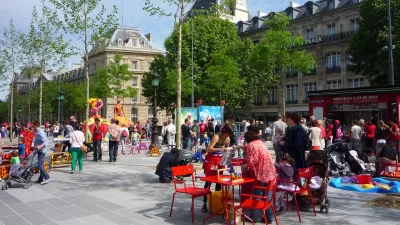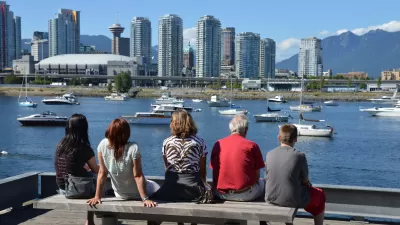The Project for Public Spaces celebrates its 40th anniversary this year, spanning a seismic shift from modernist planning and urban decay of the 1970s to the urban resurgence and focus on smart growth of today. PPS's Ethan Kent reflects.

The Project for Public Spaces, one of the country's leading advocates for placemaking and revitalization of public spaces, was founded in the depths of urban decay in 1975. At the time, big projects and top-down planning held sway. Inspired by Jane Jacobs, founder Fred Kent advocated for many of the urban innovations that are commonplace today.
His son Ethan continues that work, contending that, for all its changes, contemporary policymaking still has not embraced placemaking as a core principle.
One of the challenges lies in the amorphous definition of "place." Even if "place" is important, if policymakers and planners cannot define it, they often have trouble promoting it. In a Q&A for Policy Innovations, Kent said:
"A place is how we are attached to our community, how we experience our world and our community. It's really the patterns of social activity, the cultural openness, commercial and cultural relationships that make a place. There is no formal discipline that is really delivering "place." Just having a space be public space alone isn't often giving value to places, and design is only a small part of what makes a place work."
That's changing with a "place capital metric" being used in Adelaide, Australia, and promoted by PPS. "We measure how businesses are doing, how many people are using the spaces, stationary activity, whether people are gathering in groups, whether there are enough women, children, and elderly in the public space, etc.," said Kent.
Then again, there are even more ambiguous ways to evaluate cities—not by amenities and attractiveness but by the emotional connection between cities and their inhabitants:
"The livability or quality of life lists [that are published every year] look at cities that best balance economic competitiveness and leisure activity, which are the most expensive cities in the world....I think is more about loveabilty, attachment and comfort; and those qualities can occur in some of the poorest parts of the world too."
FULL STORY: What Makes a City Great? It’s not the Liveability but the Loveability

Manufactured Crisis: Losing the Nation’s Largest Source of Unsubsidized Affordable Housing
Manufactured housing communities have long been an affordable housing option for millions of people living in the U.S., but that affordability is disappearing rapidly. How did we get here?

Americans May Be Stuck — But Why?
Americans are moving a lot less than they once did, and that is a problem. While Yoni Applebaum, in his highly-publicized article Stuck, gets the reasons badly wrong, it's still important to ask: why are we moving so much less than before?

Using Old Oil and Gas Wells for Green Energy Storage
Penn State researchers have found that repurposing abandoned oil and gas wells for geothermal-assisted compressed-air energy storage can boost efficiency, reduce environmental risks, and support clean energy and job transitions.

Minneapolis Bans Rent-Setting Software
Four cities have enacted restrictions on algorithmic software that can inflate rent costs.

Oakland to Add 244 New EV Chargers
Oakland plans to launch its new charging network at eight locations by the end of 2025.

Jane Goodall Inspires with Message of Hope, Resilience, and Environmental Action
Speaking in Pasadena, Jane Goodall offered a hopeful and inspirational message, urging global compassion, environmental responsibility, and the power of individual action to shape a better future.
Urban Design for Planners 1: Software Tools
This six-course series explores essential urban design concepts using open source software and equips planners with the tools they need to participate fully in the urban design process.
Planning for Universal Design
Learn the tools for implementing Universal Design in planning regulations.
Heyer Gruel & Associates PA
City of Moreno Valley
Institute for Housing and Urban Development Studies (IHS)
City of Grandview
Harvard GSD Executive Education
Salt Lake City
NYU Wagner Graduate School of Public Service
City of Cambridge, Maryland




























